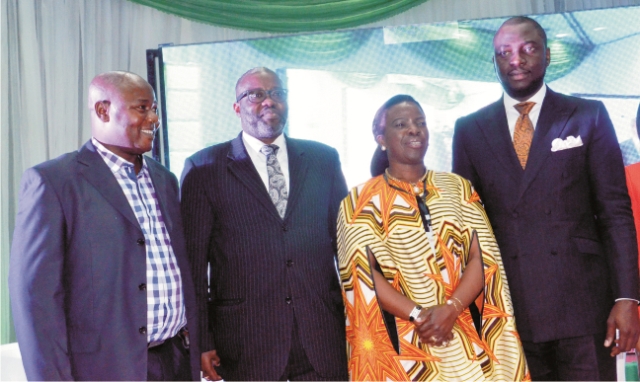Business
VC Charts Path To Solid Minerals Dev

The Vice-Chancellor,
Ahmadu BelIo University, Zaria, Prof. Ibrahim Garba, says Nigeria needs the right attitude and knowledge to develop its solid minerals sector.
Garba, who is also the Chairman, Committee on Solid Minerals Development Roadmap, disclosed this in Abuja.
“There must be correct altitude and knowledge to know what you have and how to exploit it for the benefit of the country.
“There was nothing new in the solid minerals roadmap, but certainly the solid minerals (sector) is the one least understood by everybody – public, government and even by government officials themselves.
“It is a sector that is not known to Nigeria even though Nigeria had very glorious mining in the past which died since 1970s.
“And that is why the modern Nigeria has not come to know mining as a business, as a means of sustaining the nation’s economy, other than mining of petroleum which is also mining.”
Garba said for this reason, Nigeria had continued to struggle with the understanding of what it would take to develop the solid minerals sector.
He said that even though in the last 10 years, the Federal Government had been striving to reform the sector, unfortunately the sector had yet to occupy the right place in the development of the country’s economy.
He said the solid minerals sector remained largely undeveloped because of ignorance and poor attitude toward the sector.
Garba underscored the need for adopting the right approach for the sector, which was basically knowledge-based and knowledge-driven, to attract investors.
“We must have the correct altitude because it is a business sector where you need to attract investments and investment funds from potential investors,” he said.
The vice-chancellor said that the knowledge aspect of mining cut across scientific knowledge of knowing the minerals, knowing where they were, how they were formed and how to find them.
He said that government must also have knowledge of how to provide an environment that was conductive to investments and how to nurture the sector as means of development.
Garba said that mining was a potent means of revenue generation, adding that revenue generated must, however, be used for more sustainable development since mining was not renewable like agriculture.
“Mining is very destructive to the environment. It is based on finite resources means that the amount of resources you find will one day finish; it is not renewable.
“Due to these constraints and challenges around the sector, government upon government failed to understand probably what it takes to develop the sector. And whenever our leaders understand it, they failed to take the correct steps to make it work.
“In the last 10 years, the roadmap has been there but we miss it 10 years ago and we have to go back 10 years and recover the roadmap and follow it,” he said.
Garba said that 10 years ago, all the necessary instruments of reform, in terms of the legal framework, institutional framework and technical ingredients to push the sector forward, were put in place but were not followed.
He said Mining Act was enacted in 2007 and the institutional reforms were put in place in 2006, adding, however, that successive governments failed to develop the solid minerals sector up to the recommended level.
He emphasised that mining was a competitive sector and that Nigeria’s neighbours were doing well in the sector.
“Petroleum resources have spoiled everything in Nigeria. As long as petroleum dollars flow into this country without any efforts of our own, it will kill all morale and means of hard work.
“And this sector is not like petroleum, even though there are all minerals. It requires much hard work to get it going,” he said.
Garba recalled that 10 years ago, the solid minerals could have been well developed, with local and international input, adding that nowadays, its development required a different approach.
He said that in the course of the work on the roadmap, all the existing instruments were re-assembled and put in context in relation to the current realities in Nigeria.
“We needed this more today than 10 years back because our challenges today are worse than our challenges 10 years back,” he said.
He urged government to take deliberate steps aimed at promoting the development of the sector so that Nigeria would not miss the mark as it did 10 years ago.
Garba recalled during colonial era, all the mining activities in Nigeria were carried out 100 per cent by private sector companies.
He advised government to encourage private companies invest in the mining sector.
Transport
Automated Points Concession : FAAN Workers Gave 72hrs To Revise Decisions In PH

Transport
FAAN Announces Pick-Up Points for Go-Cashless Cards

Business
Fidelity Bank To Empower Women With Sustainable Entrepreneurship Skills, HAP2.0
-

 Politics3 days ago
Politics3 days agoSenate Urges Tinubu To Sack CAC Boss
-

 News3 days ago
News3 days agoAmend Constitution To Accommodate State Police, Tinubu Tells Senators
-

 News3 days ago
News3 days agoDisu Takes Over As New IGP …Declares Total War On Corruption, Impunity
-
Business3 days ago
President Tinubu Extends Raw Shea Nuts Export Ban To 2027
-
Business3 days ago
Crisis Response: EU-project Delivers New Vet. Clinic To Katsina Govt.
-
Business3 days ago
President Tinubu Approves Extension Ban On Raw Shea Nut Export
-
Sports3 days ago
NDG: Rivers Coach Appeal To NDDC In Talent Discovery
-
Rivers3 days ago
Etche Clan Urges Govt On Chieftaincy Recognition

